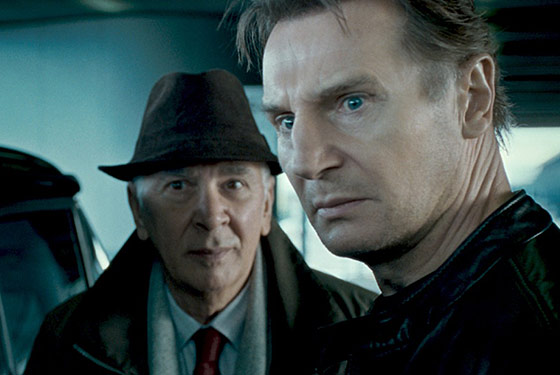
After Taken unexpectedly took in 500 quadrillion dollars, Liam Neeson became one of the world’s hottest action stars, the guy every studio wanted to see breaking bad guys’ necks. The come-on is irresistible: “You know Schindler’s list Now, meet Schindler’s fist.” And he is a magnificent hero. He’s tall and lean and, at almost 60, still unbelievably handsome — but with a haggard intensity, a face battered by grief over countless nameless losses, a suggestion of emotional helplessness even at his most physically resourceful.
In Taken, Neeson has one goal, to get back his kidnapped daughter, the child he wasn’t there for, and that’s what he does — moving in a straight, clean line, obliterating anyone in his way without a wasted motion. It’s not some pumped-up, super-trained body doing the fighting but an angry, mournful spirit — doubtless born of “the troubles” in his native Ireland but large enough to take on all the injustice in the world. The modern action filmmaker needs only to plant him onscreen, establish the most basic premise, and let the sorrows commence.
We’re with Neeson from the first shot of Unknown, as he gazes pensively out a plane window at the billowing clouds. Neeson and that sleek blonde mannequin January Jones are Dr. Martin and Elizabeth Harris, and they’re heading to Berlin in midwinter for a big-deal biotech conference at which Martin is scheduled to make a presentation. But when they arrive at their tony hotel, he discovers the cabdriver left one of his bags at the airport and leaps into another taxi, this one driven by German actress Diane Kruger, here playing a Slavic immigrant (and by the way, why don’t I get cabdrivers who look like that?), and Martin tells her to step on it, and she takes a bad turn, and there’s a bridge and a river and his head smashes hard against the window …
Four days later, Martin wakes up in the hospital with no passport or I.D., and finds that no one has been looking for him. His doctor pleads with him to stay because head injuries are unpredictable (an unfortunate narrative device on which to hang this thriller … enough said), but Martin checks himself out and hightails it to his hotel — where his wife fails to recognize him. In fact, there’s a man — played by Aidan Quinn — standing beside her whose name tag reads “Dr. Martin Harris,” and he seems quite puzzled by the bruised, unkempt, babbling stranger.
Now here’s where any discussion of Unknown is tricky, because, as Donald Rumsfeld has put it, there are “unknown unknowns — the ones we don’t know we don’t know.” And it’s best to know little if you want to enjoy Unknown, including the movie’s subgenre. Is this an amnesia thriller — which means Martin isn’t really Martin, despite what we saw in the early scenes? Is this brain-drain sci-fi, like Total Recall, or a dream-world mind-bender, like Inception? Is Martin dead but doesn’t know it? Is that really his wife or a cloned look-alike? (January Jones’s delivery is so reliably flat it’s impossible to know whether she’s genuine or lying.) Is this a paranoid conspiracy thriller in which his fate was determined prior to the accident — and was there even an accident? (Kruger’s cabbie fled the scene and disappeared.) Does any of this confusion have to do with the biotech conference and its sponsor, a prince from some unnamed Middle Eastern country, or the rumored developments in crop research? Those are some pretty big unknown unknowns.
I got the sense midway through that the filmmakers were boxing themselves into a corner and that any resolution would involve a lot of cheating and be a giant letdown. Well, there is some cheating and inevitably there’s a letdown — but not enough to keep Unknown from being a great ride.
The Spanish-born director Jaume Collet-Serra (The Orphan) keeps the movie tight and fast and endlessly upending; and, unlike most modern crash-and-bash action directors, he stages fisticuffs and car chases you can actually follow. They’re full of neat spatial gags, like the shot in which two cars, one pursued, one pursuing, make a high-speed hairpin turn in perfect synchronization, or the Hitchcockian cat-and-mouse prowl through an art gallery amid giant photos of old women’s faces.
Unknown also has two marvelous turns by old pros. Martin hires a boozy, hacking wreck of a detective played by Bruno Ganz, an ex–East German Stasi officer who’s stubbornly proud of his past and of his reputation as a “detail man.” As he makes contacts with his ex-colleagues, we end up cheering for totalitarian ingenuity! Then the grave and wickedly understated Frank Langella shows up as a colleague of Martin’s from America to sort out the mess — and to make a lot more.
My only serious quibble? Neeson takes too long to stop running away from people who want to kill him and to start bashing, shooting, and spearing them. But when he finally rises to the occasion it’s a mighty moment — as you know, with Neeson, it will be. It is, as Rumsfeld put it, one of the “known knowns,” the “things we know we know.”


